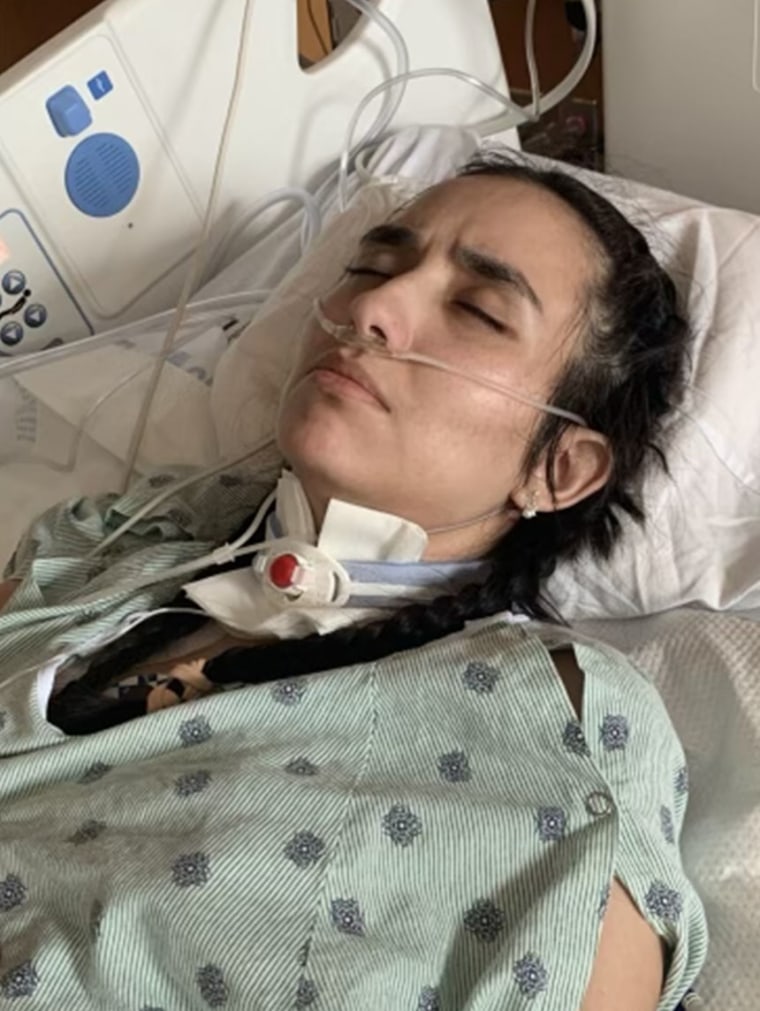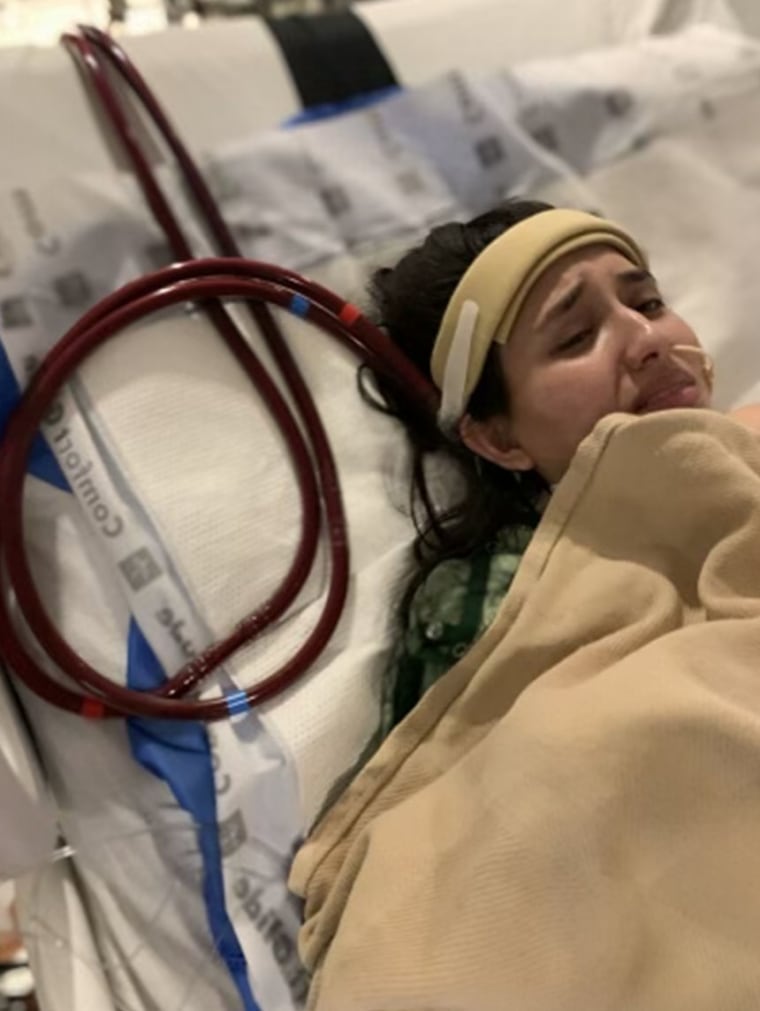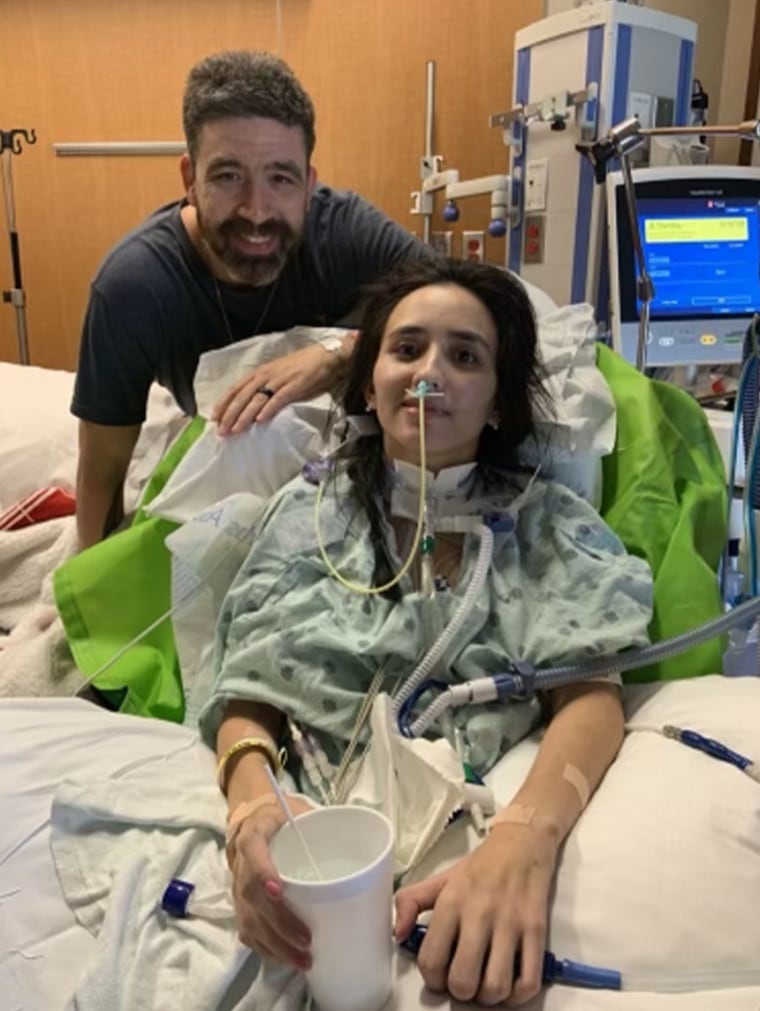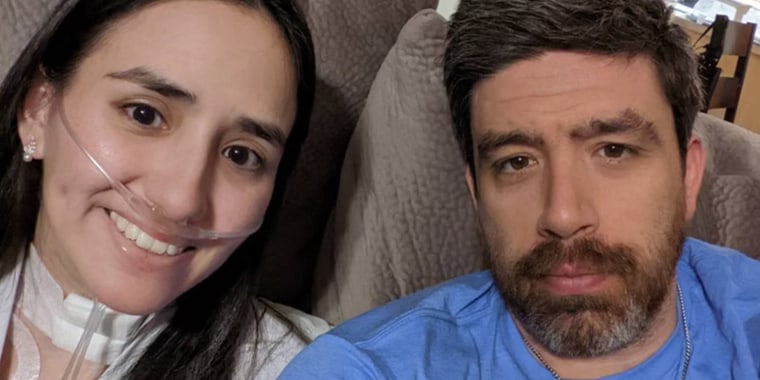In August 2021, Diana Crouch, who was 18 weeks pregnant, tested positive for COVID-19 and landed in the hospital with low oxygen levels. Soon, she was transferred to Texas Children’s Pavilion for Women to be intubated. She was later placed on ECMO — a heart-lung bypass machine that gives the lungs a break — and later experienced three strokes and a heart attack.
“On a daily basis we were having to review whether it made sense to continue keeping the baby inside of her or did we need to deliver the baby. That discussion got particularly challenging when she had those strokes and the heart attacks and was on medications for seizures and in a coma for several days,” Dr. Cameron Dezfulian, medical director of the adult congenital heart inpatient care at Texas Children’s Hospital, told TODAY. “At that point it was a really tough discussion.”
Despite the severity of her condition, she gave birth to the baby at 31 weeks and both are now at home.
“It’s pretty miraculous,” Dezfulian said. “The reality is there’s a limited number of hospitals in the country who are able to provide ECMO support and care for pregnant women.”
Morning sickness or COVID-19 symptoms?
At the end of July, Crouch and her husband, Chris, visited Las Vegas for their anniversary. When they returned Diana Crouch experienced a headache and exhaustion. Neither of them were vaccinated, but Diana Crouch previously had COVID-19.
“I honestly didn’t think I would catch it again,” Diana Crouch, 28, of Kingwood, Texas, told TODAY. “I didn’t think much of it at the time because in pregnancy you just get tired.”
When she returned she visited her obstetrician for a regular appointment and the doctor thought maybe she was dehydrated and had morning sickness. But later she developed a “low-grade fever” and the doctor recommended she visit the local emergency room.
“We were worried at that point because we didn’t know if it would be affecting the baby,” Diana Crouch said. “I went to the ER. I tested positive for COVID and they told me just to monitor my oxygen levels.”

Two days later on Aug. 6, they returned to the emergency room.
“I still didn’t think anything of it because even people that I knew at work that went to the hospital were just put on oxygen for a few days and they went home,” Chris Crouch, 37, told TODAY. “I thought we’d be back home after five days. Unfortunately, it turned into 139 days.”
Diana Crouch doesn’t remember much from the next several months. For the first three days, she was on oxygen. But doctors wanted to put her on a ventilator.
“She said, ‘I’m not going on a ventilator,’ and I remember the nurse saying, ‘Well I’m trying to save your life,’” Chris Crouch recalled. “Then they put her on a BiPAP machine shortly after that, which is a little more stronger flow of oxygen.”
The mother-to-be's condition continued worsening and doctors wanted to place her on the ventilator and her husband agreed.
“I didn’t think it was going to get that serious,” he said. “I didn’t know what to do. I was just really scared.”
The ventilator kept Crouch stable, but she wasn’t improving and the doctors worried what being on a ventilator too long might do to her lungs. Her condition began “dwindling,” Dezfulian explained, and doctors recommended she be placed on ECMO.
“ECMO was the last resort,” Chris Crouch explained. “(They said) ‘This is her best chance at survival and the baby’s best chance.’ So I prayed about it.”
Chris Crouch also asked his wife's parents what they thought.
“They still said, ‘We trust your decisions. Just bring our daughter home,’” he said.
The next day Diana Crouch was put on ECMO. About a month later, though, she had three strokes and a heart attack.
“Her risk factors for clotting were the fact that she had COVID and the fact that she was pregnant and the fact that she was on ECMO,” Dezfulian said. “Unfortunately, she also had a hole in her heart that had blown open that allowed for blood clots on the right side of the heart to essentially cross over to the left side.”

Chris Crouch worried about his wife and baby. The doctors shared how precarious it was for pregnant women with COVID-19 on ECMO.
“The statistics say that I guess 12 women have carried a baby on ECMO. So she easily had the worst pregnancy ever. It was a nightmare,” Chris Crouch said. “It just kept getting worse and worse and worse and worse.”
But then Diana Crouch slowly started improving.
“So she came off of ECMO when the baby was 28 weeks because her lungs just improved and she was doing better. She recovered from the strokes, she woke up,” Dezfulian said. “We got her back to ambulatory, meaning standing up and walking and doing things again.”
She still had a tracheostomy so the hospitals gave her oxygen via her nose and occasional put her on the ventilator.
“The ability to ventilate her meant that the clot risk went down a lot. Now, it still wasn’t that low because she was still pregnant, she still had COVID and we still knew she had this hole in her heart,” Dezfulian said. “But it was a little safer.”
The medical team still wanted Diana Crouch to carry the baby as long as she could. She was “weaned down” on the ventilator and was breathing on her own. It seemed like she might not even need to be on the ventilator at all, but then she stopped progressing.
“She kind of plateaued at that point and it increasingly looked like the growing fetus was the reason for that. It was holding her back from being able to progress with her lungs,” Dezfulian said. “She actually developed a pneumothorax, which is air inside the lung cavity.”
That’s when her team decided to take her off blood thinners and proceed with a Caesarian-section delivery. The baby, named Cameron after Dezfulian, was born on Nov. 10, at 31 weeks.
“He did require oxygen support,” Dezfulian said. “Within a week he was actually completely off (oxygen). He did great and only spent three weeks in the hospital before going home.”
Meanwhile, Diana Crouch was transferred to Methodist Hospital. Doctors thought she might need a lung transplant. But something wonderful happened: She started improving.
“They were able to wean her quite effectively,” Dezfulian said. “She was up and walking within three or four days of her arrival there. She was off the ventilator.”
Her family felt thrilled.
“We were happy,” Chris Crouch said. “We didn’t want a lung transplant.”
Coming home
Two days before Christmas, Diana Crouch finally came home.
“Coming home was very emotional for me,” she said. “I actually felt a little bit down for a couple of days. It’s a lot for me to take in. I hadn’t seen my kids for so long.”
Since being at home she’s regaining her strength.
“Her hand is just really weak,” Chris Crouch said. “The hand is probably the last part (to improve) because of fine motor skills to come back. She can walk around. She goes up and down the stairs now. She holds the baby. She’s almost back to normal.”
She still wonders what her experience with COVID-19 means for her health.
“I worry a lot. I’m scared. I just don’t know the effects my body when through,” she said. “It was no joke. It wasn’t anything good. I just don’t know what the future holds.”

Dezfulian says being vaccinated is the best way for pregnant people to avoid serious COVID-19 symptoms and complications.
“There’s good data that vaccines are safe and they’ve very effective in terms of preventing severe illness,” he said. “If pregnant women are vaccinated their chances of getting so sick that they need ECMO are exceptionally low.”
The couple have since been vaccinated. Diana Crouch admitted that she was afraid of getting a vaccine while pregnant but now regrets that.
“I was so scared of putting something in my body that would affect my baby. But I ended up getting so much more and I exposed my child to so many things that I would have never thought,” she said. “I learned the hard way. I don’t like to push anybody into stuff. I don't like to but I encourage everyone to get vaccinated.”
Related:
